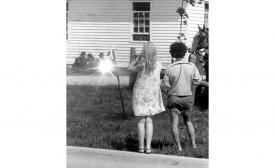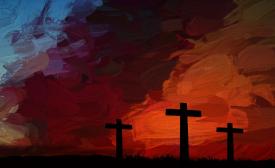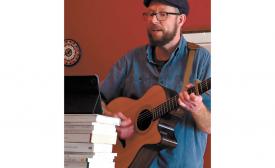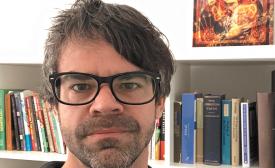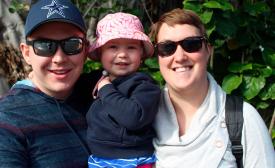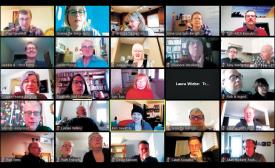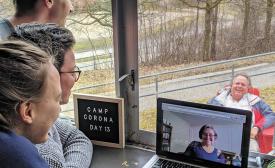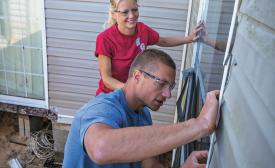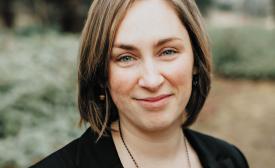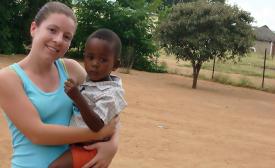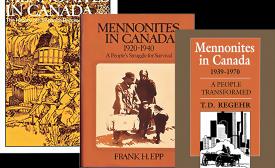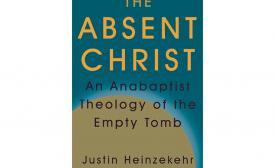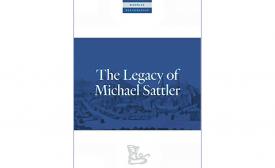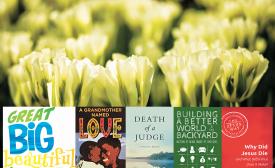Volume 24, Number 8
Beyond ourselves
As I write, my household is entering into our fourth week of physical distancing. Facing the fast-spreading and potentially deadly coronavirus, my spouse and I sit in a comfortable house, with a dependable supply of food and are thankful for good sanitation. We have books, music and movies. We’re still employed, and we’re connecting digitally with a network of family and friends.
Well rooted, well winged
For most of us, the biblical canon with its 66 “books” has always been a given, inherited from the past, our parents and churches. We have not concerned ourselves very much with it, even though we may have heard that the Catholic version of the Bible has more “books” in it than the Protestant version.
Readers write: April 13, 2020 issue
Reader was ‘struck by’ Easter feature’s deficiencies
Re: “Out of holy weakness, mysterious power arises,” March 16, page 4.
In uncharted waters
As with everybody else, my life and work these past few weeks have been a scramble to adjust and respond to the ever-evolving pandemic that has now hit us here in Canada as well.
Mennonite resistance
Tourists attempt to photograph boys outside of the Elmira Old Order Mennonite Meetinghouse, circa 1970. The boys are using a hand mirror to thwart their efforts. The photo appeared in the local newspaper with the caption “Mennonite Resistance.” After the Second World War, urban Canadians embraced rural tourism.
How broad is salvation?
Someone told me recently that they had been asked to share their faith journey in a Sunday morning church service. The invitation, however, came with an addendum: “Don’t talk about universalism.”
At the end of that conversation, I reached for my phone dictionary for a definition. “Universalism” is “a theological doctrine that all human beings will eventually be saved.”
The public good in a time of pandemic
The COVID-19 pandemic feels surreal. Streets of our cities are nearly empty, even at rush hour. Kids are home, schools have gone online, and some workers log in from home after many years of regular commutes to an office. And huge numbers of workers have been laid off.
Smudged with humanity
It often feels like the God I encounter in Scripture is a completely different God than the one I profess to follow and worship.
Mennonite encounters with contemplative prayer
 Doug Klassen, who now serves as Mennonite Church Canada’s executive minister, confessed to a fellow pastor that he couldn’t pray for more than 10 minutes. “I came to a place where I kept running into myself when I was praying,” Klassen recalls of his early days as a youth pastor.
Doug Klassen, who now serves as Mennonite Church Canada’s executive minister, confessed to a fellow pastor that he couldn’t pray for more than 10 minutes. “I came to a place where I kept running into myself when I was praying,” Klassen recalls of his early days as a youth pastor.
Musician offers online singalong
“A little bit of yeast makes the whole dough rise . . . you do your part; I’ll do mine,” sings Bryan Moyer Suderman, using his body as a percussion instrument. But instead of singing at a concert or a worship service, the itinerant musician is at home singing into an iPad propped up on a stack of books, doing his part to practise physical distancing in light of the COVID-19 pandemic.
Pastor calls for governmental change amid COVID-19
While people and governments alike are sprinting to mitigate the current crisis of COVID-19, David Driedger is starting to run the marathon of addressing its long-term implications.
Saskatchewan health-care professionals reflect on COVID-19
Mennonite Church Alberta holds virtual AGM
With COVID-19 limiting the ability to connect in person, virtual meetings now seem to be the wave of the future. Mennonite Church Alberta had already been using the Zoom platform to hold small provincial committee meetings online, but when its annual general meeting (AGM) was cancelled, the regional church decided to explore whether a larger meeting with Zoom could work as well.
Nourishing body, mind and spirit
The spread of the global COVID-19 pandemic has forced Canadians to learn to cope with forced isolation, loss of work and social events, and an uncertain future. For a church community accustomed to weekly worship services and small group gatherings, learning how to maintain a sense of community and foster wellness among members presents an unprecedented challenge.
Grebelites continue in community amid COVID-19 separation
Most people’s lives have shifted dramatically in the past few weeks, as they grapple with social isolation, educational upheaval, job changes, pandemic preparations and health-care emergencies surrounding COVID-19. Conrad Grebel University College is no different.
COVID-19 has significant impact for MDS
For Mennonite Disaster Service (MDS), COVID-19 has had a significant impact on operations.
It started on March 13, when the organization closed all current projects in locations across the United States due to the coronavirus; there were no projects in operation in Canada. A week later, it suspended all summer programs in both countries.
MC Eastern Canada appoints new executive minister
Leah Reesor-Keller has been appointed as Mennonite Church Eastern Canada’s next executive minister. She will begin her new role in late summer, replacing David Martin, who will retire this summer after 15 years in the position.
A story that ‘wanted to be told’
After high school, Susanna Compton took a gap year before heading off to university. She turned that experience into her first published book.
Updated history of Mennonites in Canada commissioned
The last time a history of Mennonites in Canada was published, it covered the period from 1920 to 1970—the year Pierre Trudeau was prime minister, Canada was converting to the metric system, the federal voting age was lowered to 18, and the October Crisis rocked Quebec.
It was a long time ago, in other words.
Conspicuous absences
The Absent Christ is a clearly written and compelling exploration of Anabaptist-Mennonite theology that engages with both historical Anabaptist sources and contemporary political concerns, in order to advance a constructive argument centred on the figure of the empty tomb.
Intriguing novel explores family trauma
Unsettled with her status as a newly retired person, an archivist uses her skills to look into the difficult parts of her own family history. Along the way, she uncovers a shocking event that explains the intergenerational trauma in the family. The experience helps her learn to accept herself and love others more unconditionally.
Classics of the Radical Reformation series relaunched
Over the past 50 years, the Institute for Mennonite Studies at Anabaptist Mennonite Biblical Seminary, Elkhart, Ind., has published a series of books making primary works of the Radical Reformation available in English.






